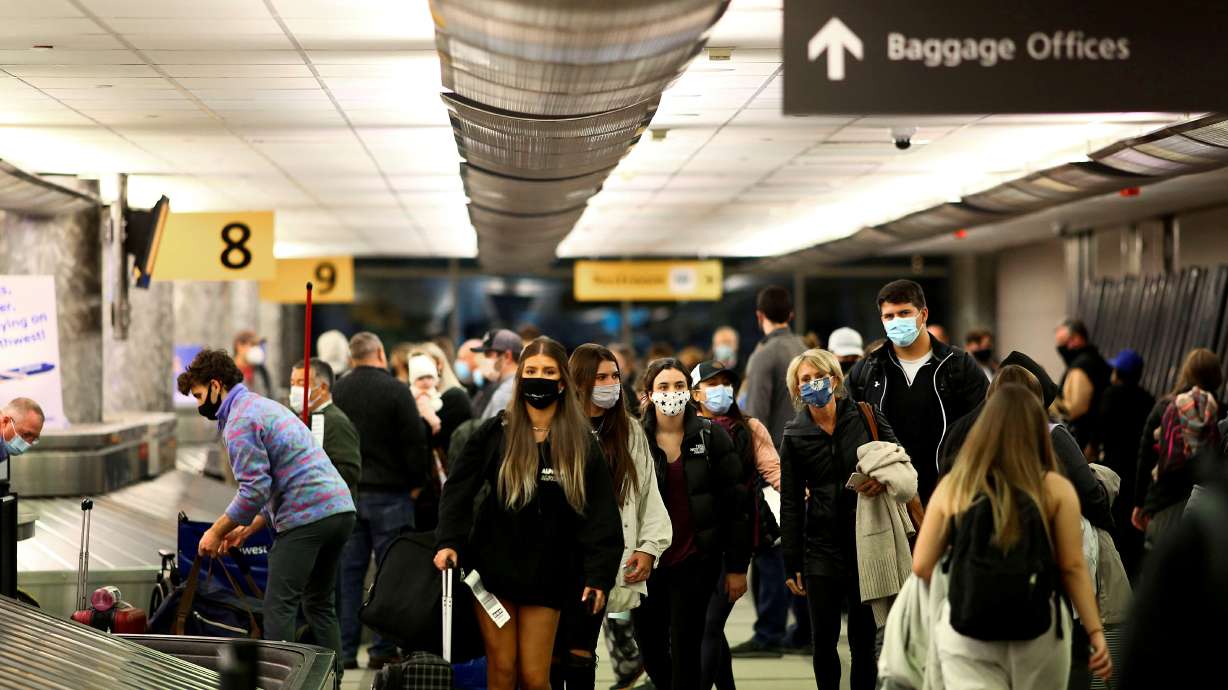Travelers wearing protective face masks to prevent the spread of the coronavirus disease reclaim their luggage at the airport in Denver, Nov. 24, 2020. The United States is expecting a flood of international visitors crossing its borders by air and by land on Monday after lifting travel restrictions for much of the world’s population. (Kevin Mohatt, Reuters)
Estimated read time: 5-6 minutes
WASHINGTON — The United States is expecting a flood of international visitors crossing its borders by air and by land on Monday after lifting travel restrictions for much of the world’s population first imposed in early 2020 to address the spread of COVID-19.
United Airlines is expecting about 50% more total international inbound passengers Monday compared to last Monday when it had about 20,000.
And Delta Air Lines Chief Executive Ed Bastian has warned travelers should be prepared for initial long lines.
“It’s going to be a bit sloppy at first. I can assure you, there will be lines, unfortunately,” Bastian said, adding that “we’ll get it sorted out”.
Delta said in the six weeks since the U.S reopening was announced it has seen a 450% increase in international point-of-sale bookings versus the six weeks prior to the announcement.
White House spokesman Kevin Munoz said on Twitter “As we expect high demand when the U.S. lifts its existing air and land travel restrictions Monday, we are taking critical steps to be prepared by providing additional resources.”
The Biden administration has held multiple calls with U.S. airlines to prepare for the influx of additional travelers that will begin arriving at U.S. airports and has warned travelers crossing from Canada and Mexico by land or ferry to be prepared for longer waits starting Monday.
For Bhavna Patel, a flight from London will take her to New York on Monday to see her first grandchild after more than a year of watching him grow via FaceTime.
The rules have barred most non-U.S. citizens who within the prior 14 days have been in 33 countries — the 26 Schengen countries in Europe without border controls, China, India, South Africa, Iran, Brazil, Britain and Ireland.
Trade group U.S. Travel said the countries accounted for 53% of all overseas visitors to the United States in 2019 and border communities were hit hard by the loss of tourists crossing from Mexico and Canada. The group estimates declines in international visitation “resulted in nearly $300 billion in lost export income” since March 2020.
U.S. airlines are boosting flights to Europe and other destinations that were impacted by the restrictions. Airlines are planning events on Monday with executives meeting some of the first flights.
Commerce Secretary Gina Raimondo and United Airlines President Brett Hart are holding an event at Chicago’s O’Hare International Airport Monday to mark the reopening.
U.S. officials plan an Instagram live chat on Nov. 9 to help answer questions.
Many international flights are expected to operate close to full or full on Monday, with high passenger volume throughout the following weeks.
What travelers to the US need to know
The Biden administration’s new rules requiring most foreign nationals to be vaccinated before flying to the United States take effect at 12:01 a.m. EST on Nov. 8.
Passengers will need to show an “official source” showing vaccination status, and airlines will need to match the name and date of birth to confirm the passenger is the same person reflected on the proof of vaccination.
The U.S. Centers for Disease Control and Prevention has said it will accept U.S. Food and Drug Administration approved or authorized and World Health Organization emergency use listed vaccines.
All travelers must produce a negative viral test result within three days prior to travel to the United States. Unvaccinated U.S. citizens and others getting exemptions must provide a negative test taken within one day before traveling.
Children under 18 are excepted from the vaccination requirement but children between the ages of 2 and 17 are required to take a pre-departure test. Unvaccinated foreign nationals under 18 will not have to self-quarantine upon arrival. Non-tourist travelers from nearly 50 countries with nationwide vaccination rates of less than 10% will also be eligible for exemption.
If traveling with a fully vaccinated adult, an unvaccinated child can test three days prior to departure, but if an unvaccinated child is traveling alone or with unvaccinated adults, they will have to test within one day before departure. Exemptions include certain COVID-19 vaccine clinical trial participants, those with valid medical reasons for not getting vaccinated and those who need to travel for emergency or humanitarian reasons, but they will need a U.S. government-issued letter affirming the urgent need to travel.
The CDC said there are no exceptions for the vaccine requirements “for religious reasons or other moral convictions.”
Non-tourist travelers from nearly 50 countries with nationwide vaccination rates of less than 10% will be exempt from the requirements but must agree within 60 days to get vaccinated under most conditions. Travelers must sign an attestation that they have been vaccinated and are warned that “willfully providing false or misleading information may lead to criminal fines and imprisonment.”
The Transportation Security Administration plans to issue a security directive that provides the legal basis for airlines to check vaccine records. The CDC also issued a Contact Tracing Order that requires all airlines flying into the United States to collect and keep on hand for 30 days and disclose to the CDC if needed contact information including phone numbers, email and U.S. addresses that will allow health officials to track infections. The collection requirements take effect Nov. 8.
The CDC released a travel assessment tool on Monday for people planning international trips, including an extensive question and answer section for travelers.
Also Monday, new contact tracing rules will take effect requiring airlines to collect information from international air passengers if needed “to follow up with travelers who have been exposed to COVID-19 variants or other pathogens.”
